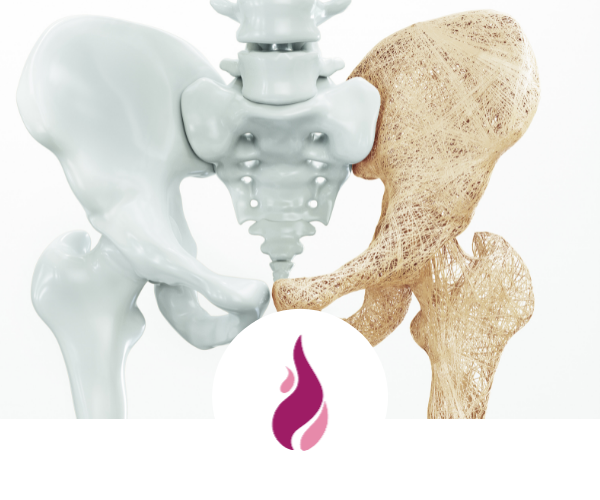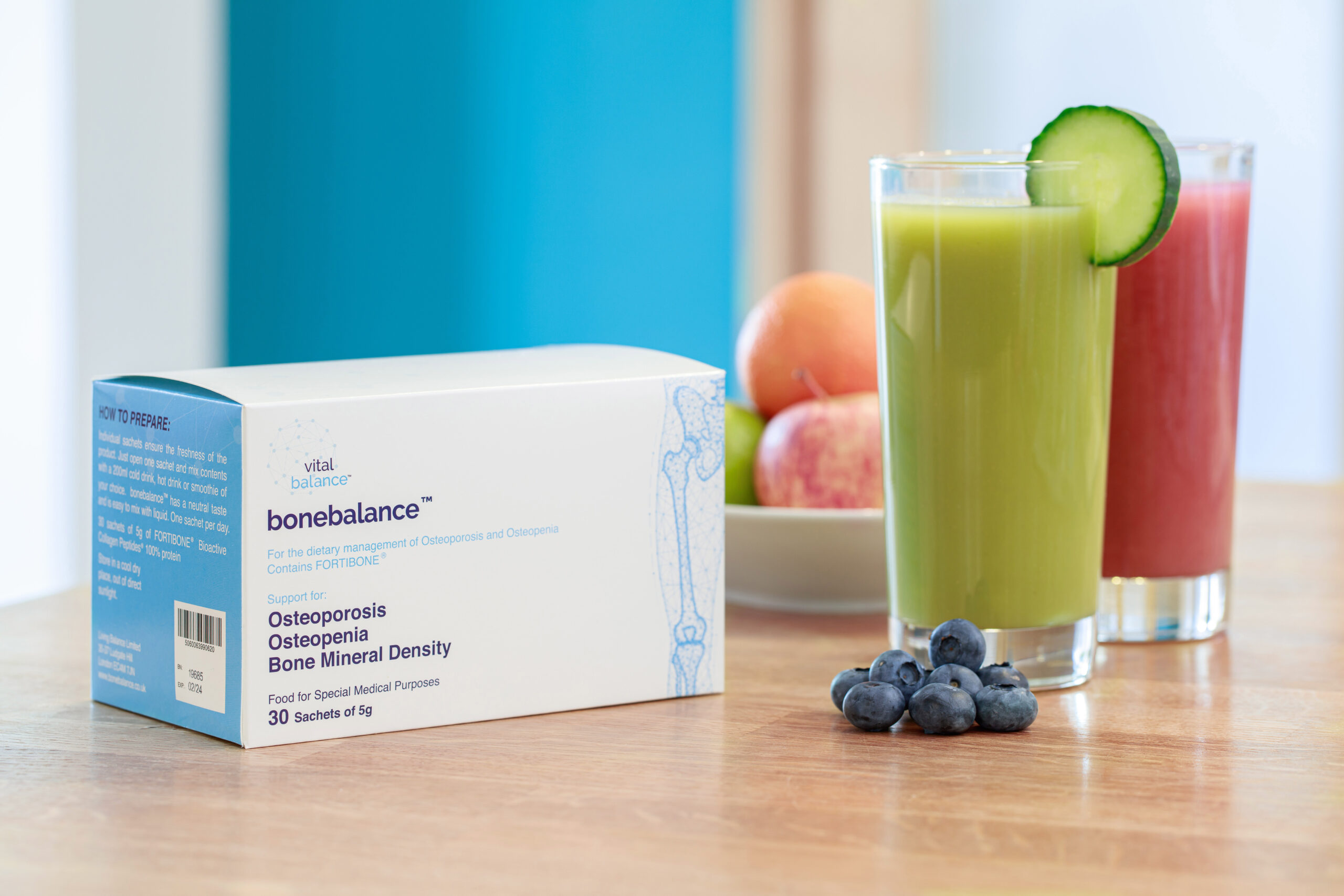Why collagen is key to protecting your bones at menopause

Osteoporosis is the bone thinning disease that results when bone resorption (breaking down) outstrips our bone formation. Prior to this disease taking hold, is a condition known as osteopenia where bones have a lower bone density than normal at a given age. While having osteopenia doesn’t mean you will go on to develop osteoporosis, both conditions will continue to worsen if not addressed.
How common are these conditions?
Around three million people in the UK are estimated to have osteoporosis, with several million more likely to have osteopenia. The vast majority of sufferers are women but, less well known is the fact that men may also fall victim to either condition. And, to dispel another commonly held myth, osteoporosis doesn’t just affect ‘frail old ladies’ – it’s not uncommon for people in their 40s and 50s who appear fit, active and well to discover they have the disease.
Looked at more closely, the statistics from The Royal Osteoporosis Society make worrying reading:
- 1 in 2 women and 1 in 5 men over the age of 50 are expected to break a bone during their lifetime as a result of osteoporosis
- It is estimated that 500,000 women in the UK aged 50-64 have osteoporosis
- It is estimated that every year in the UK there are more than 500,000 fragility fractures, that’s over one every minute
- 54% of people who fractured a bone have experienced height loss or a change in their body shape
- 1 in 4 people dies within a year of suffering a hip fracture
How can I tell if I’m at risk?
In short, it is difficult to know. This is why osteoporosis is known as the ‘silent disease’ because it can progress unnoticed for many years until a fracture occurs. In the UK, we don’t routinely have a DEXA (bone density scan) until after one or more fractures have occurred. But by then it’s too late – our bone health is already compromised! This makes us vulnerable to common fracture sites linked to osteoporosis: the thigh bone (femur), at the hip, vertebrae and wrist.
Forewarned is forearmed
Given that it is difficult to detect under current medical procedures and that osteopenia and osteoporosis are both fairly common conditions, it makes sense to guard against them. It is highly recommended to take preventative action by considering diet, exercise and lifestyle changes to help promote strong healthy bones.
Alongside these steps, a specific form of collagen has been found to play a big part in protecting and producing strong, flexible bones.
Collagen – the key to strong flexible bones
Most people think of Vitamin D and calcium as natural supplements that are good for our bones and it is true that we should ensure both are plentiful in our diet. Eating dairy foods, dark green leafy veg and having at least 20 minutes in the sunshine each day will help us achieve this. Supplementation of Vitamin D and calcium is also recommended if we fear we are falling short of either.
Less commonly known is the VITAL role that collagen plays in forming strong, flexible bone tissue. Most of us think of collagen as for ‘skin, hair and nails’. And certain collagens do, indeed, help here. But collagens come in different forms and have different molecular weights. Imagine the different collagens as different keys that unlock specific physiological effects in our body. A ‘Skin, Hair and Nails collagen’ will not bring any benefit to our bones, as the collagen ‘key’ is the wrong shape. Only the ‘bone collagen key’ will unlock the beneficial results of increased bone density.
Where can I find the ‘bone collagen key’?
The best form of collagen for bone is Bioactive Collagen Peptides ® which have been developed to be absorbed into human bone tissues. There is plenty of science and research showing its effectiveness but, in simple terms, Bioactive Collagen Peptides® are powerful protein molecules that act as the building blocks for healthy bone tissue. They bring that all-important flexibility to our bones, as well as improving density, to allow our bones to absorb more impact and resist breaking.
Specific Bioactive Collagen Peptides® are found in bonebalance™ – a natural powdered supplement and a Food for Special Medical Purpose approved for bone mineral density, osteopenia and osteoporosis.
bonebalance™ comprises 100% high-quality specific Bioactive Collagen Peptides® that are clinically proven to help form bone matrix – the tissue that gives bones tensile strength and flexibility. Independent studies show it starts working within six days, such is its high absorption rate into our bone tissue. There it helps to increase the bone building cells (osteoblasts) and reduce the bone breakdown cells (osteoclasts). It also helps make up bone matrix structure which is partly formed of collagen. It’s good to know that bonebalance™ can be taken alongside any prescribed medication and has no known side effects. That brings total peace of mind…as well as strength to our bones.
 How do I take it?
How do I take it?
bonebalance™ is a flavourless powder which can be easily dissolved into water, juice, tea or coffee. Alternatively, the powder can be added to yoghurt, smoothies or juice and consumed that way. It really is that simple – not to mention being a welcome relief to people who don’t like taking pills.
To find out more, go to www.bonebalance.co.uk
Use code MENO-BB for a unique 5% discount.
If you have received a diagnosis of osteoporosis or osteopenia, then you are classed as being under medical supervision and it is recommended to let your health care professional know that you are taking bonebalance™. However, if you wish to take bonebalance™ preventatively to protect your bone health, you can rest assured that as it is categorised as a Food For Special Medical Purpose (FSMP) for the dietary treatment of bone mineral density, osteopenia and osteoporosis, you can take it safely each day without prescription.